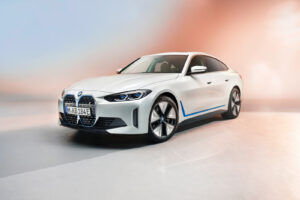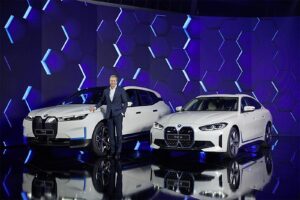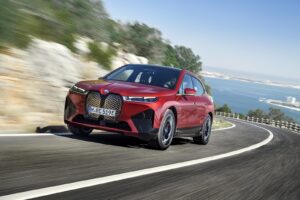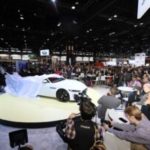BMW is clearly anxious to regain momentum in the small but growing battery-car market, the Bavarian automaker revealing plans Wednesday to bring the new i4 to market three months earlier than originally scheduled.
The announcement came hours after BMW provided new details about the launch of another all-electric model, the iX. All told, the luxury brand plans to have electrified options, including hybrids and battery-electric vehicles, available in 90% of the segments it competes in by 2023. And it expects BEVs alone to generate “well over 50%” of its annual sales by 2030.
“We have a clear roadmap for making the transformation of our industry a real competitive advantage for BMW in the coming years: uncompromisingly electric, digital and circular,” Chairman Oliver Zipse said during the automaker’s annual meeting.
Early pioneer now playing catch up

BMW’s Zipse laid out the company’s electrification plans, including BEVs making up at least 50% of sales by 2030.
BMW was an early pioneer in electrification with products like the all-electric i3 city car and i8 plug-in hybrid sports car. But it has slipped behind some key rivals in recent years, in part, due to internal debate over the approach to take with electrified drivetrains.
It had been planning to use platforms capable of handling everything from gas and diesel to all-electric but future BEVs now will ride on unique, skateboard-like platforms.
The transition begins this year, BMW getting ready to start taking orders for both the i4 and the iX, the latter the production version of the iNext concept.
The i4 will reach showrooms in Germany and some other key markets before the end of this year, a full quarter ahead of the original target. Deliveries of the iNext begin in early 2022.
They will join the three all electric models the company currently offers, the BMW i3 and iX3 and Mini SE, said Zipse. That will “signalise the start of our technology offensive in 2021: these two all-electric vehicles will set the bench

The new i4 debuted three months earlier than expected and is part of the company’s “neuer klasse” of vehicles.
mark for BEVs going forward,” the BMW chairman said in a statement.
The “Neue Klasse”
By 2023, BMW expects to have “around a dozen fully electric models” in production worldwide, he added. It also will have various hybridized products.
In the “third phase” of its electrification program, BMW will launch what it described as the “Neue Klasse,” or New Class, of vehicles. These are expected to use an entirely new platform developed specifically for all-electric products.
Additionally, they will use a “completely redefined” electrical and software architecture, “a new generation” of batteries and electric drivetrains, and will adopt a “radically new approach to sustainability across the entire vehicle life cycle.”
BMW said it is taking steps to ensure that the entire manufacturing process of future products will be more environmentally friendly, starting from the mining of raw materials. That it will put a premium on recycling of critical materials such as the lithium in its batteries, while turning to renewable energy to power its factories.
Other BMW brands going electric, too
While Wednesday’s announcement primarily focused on the flagship BMW brand, the automaker noted that its British-based marque, Mini, is set “to become a fully electric brand by the early 2030s.”
Last September, Rolls-Royce CEO Torsten Müller-Ötvös revealed that the ultra-luxury brand is working on its own BEV. It is under pressure to electrify at several levels, archrival Bentley itself planning to go completely electric by the end of this decade.
Bentley parent Volkswagen AG is accelerating its overall electrification program with a goal of being the industry leader by the middle of this decade.
Its own high-line brands are rapidly shifting to battery propulsion, including not only Bentley but also Audi and Porsche. Industry observers question whether that could force BMW to move even faster than the plan it outlined Wednesday.
Like its rivals, BMW acknowledged it has ramped up spending on its electrification program. That is expected to strain industry profits in the coming years, according to various analysts. Complicating matters, the higher production costs have made it difficult to maintain traditional profit margins on BEVs.
Making money on EVs
But Zipse was optimistic about BMW’s finances, despite the increase in R&D and related spending. If anything, the company’s statement said that, “Despite the volatile situation brought about by the global spread of coronavirus, the BMW Group expects business to develop positively and the risk situation to remain stable in the financial year 2021.”
If anything, the automaker described “electric mobility” as “a key growth driver in 2020.” It sold 192,662 battery-based vehicles last year through the BMW and Mini brands, a 31.8% year-over-year increase. In Europe, it added, those hybrids and BEVs now account for a full 15% of total sales.
/**/




